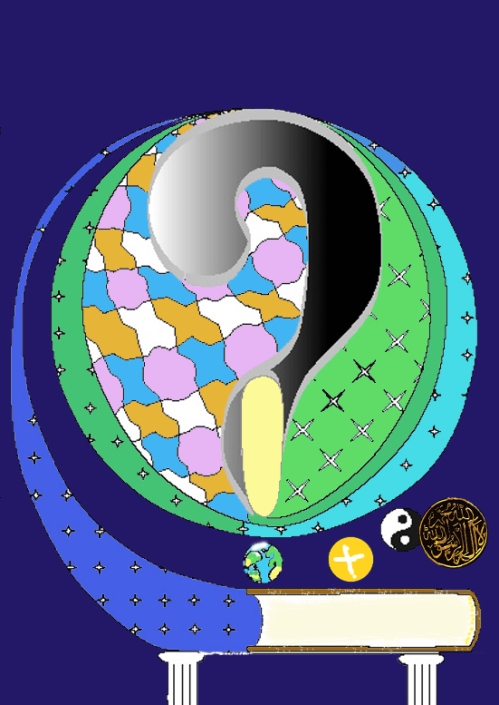 Once we spend some thought on belief, we inevitably meet the issue of plurality in religion. Is the origin of a new religion or a religious school of thought the work of a thinker, or is it a new divine revelation? This is the most essential, as well as the most unanswerable question. However, the consequences of new religious ideas are considerable, and it is up to all of us to lead them into desirable directions. It is tempting to accuse a religious innovator of self-invented holiness, for what proof can he offer. And what proof can we offer, for that matter! Tolerance towards difference in religion and religious innovation has differed through history, as religion as a factor of truth and order in society has differed. In times that religion had a limited role, tolerance of dissidence increased -- apparently. Sometimes the ruling class was tolerant and had to put up with a minority that claimed to hold the final truth. For instance, in the Roman era the conquered peoples were allowed to leave an image of their god or gods in the Pantheon, together with the other gods, among whom the Roman gods. The freshly emerged Christians refused this, because their main concept was that of one unique god, next to whom no room is allowed for other gods. This apparently threatening attitude ended Roman tolerance towards Christians. Even today we witness persecution and oppression of minorities, sometimes even the majority of a people, by the dominant religious group.
Once we spend some thought on belief, we inevitably meet the issue of plurality in religion. Is the origin of a new religion or a religious school of thought the work of a thinker, or is it a new divine revelation? This is the most essential, as well as the most unanswerable question. However, the consequences of new religious ideas are considerable, and it is up to all of us to lead them into desirable directions. It is tempting to accuse a religious innovator of self-invented holiness, for what proof can he offer. And what proof can we offer, for that matter! Tolerance towards difference in religion and religious innovation has differed through history, as religion as a factor of truth and order in society has differed. In times that religion had a limited role, tolerance of dissidence increased -- apparently. Sometimes the ruling class was tolerant and had to put up with a minority that claimed to hold the final truth. For instance, in the Roman era the conquered peoples were allowed to leave an image of their god or gods in the Pantheon, together with the other gods, among whom the Roman gods. The freshly emerged Christians refused this, because their main concept was that of one unique god, next to whom no room is allowed for other gods. This apparently threatening attitude ended Roman tolerance towards Christians. Even today we witness persecution and oppression of minorities, sometimes even the majority of a people, by the dominant religious group.Why does it exist: Intolerance towards dissident thinkers and believers?
Change of religion is always accompanied by guilt feeling, both in the person who changes religion, and in the people around him or her. There is fear for divine sanctions when a person leaves the truth, and there's painful self-criticism of those around him. And what is truth, when we have no absolute knowledge of it. Leaving the faith is therefore a painful process, also for the bystanders, who fear for the dissident's well-being and future. A change into the opposite direction -- from liberal or atheist thinking into orthodox religion -- is considered no less a threat to the modern, freethinking bystanders, than an individual leaving orthodox religion to a devoutly religious society. Apart from that, no one appreciates rejection of cherished truths. Guilt feeling, fear for unknown sanctions, and hurt pride are as much cause of religious intolerance as hunger for power is. These fears are also the reason for religious communities living in separation from each other. Most of all, the individual's transfer to the other community is sometimes felt as an extra threat, and therefore it is surrounded by heavy prohibitions and barriers. As soon as people perceive that their opinions have not been proved to be necessarily and obviously superior over other people's, tolerance towards others is likely to increase -- unless those others persist in defensiveness. The pure fear of the other's possible intolerance and conquest-greed leads to intolerance and defensiveness. Another way towards more tolerance is fatigue of intolerance, and the violence it leads to, or the lapse of time. Tolerance comes from within ourselves, however, we depend on others to practice it. Often people scream before having been hit, when we all should remember that we make tolerance and freedom ourselves, by our willingness to listen and negotiate with others. It takes trust not to immediately assume an aggressive propagandist agenda in others, when they open their mouth about their religious and other beliefs. This is a difficult yet compulsory task, if peaceful and pleasant cohabitation is what we want.
It should be noted, that there is a big difference between liberal and tolerant belief. Orthodox beliefs can be tolerant, when the believer enforces them on him- or herself only. Enforcing a view is not the same as propagating and stimulating others to follow it. As soon as liberal views are forced upon societies by law, and it's inhabitants disagree, one may wonder if they loose their liberating force. The most tolerant philosophies have been forced upon people through canon barrels and concentration camps. There is no natural connection between orthodoxy and (in)tolerance.
We also should note that ties of family and friendship are not confined to nationality, language or faith. People marry and make friends across the borders. This urges to lessons in trust and tolerance.
Comments
Post a Comment